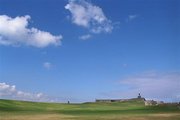Fort San Felipe del Morro
|
|
Fort_San_Felipe_del_Morro.aerial_view.jpg
Fort San Felipe del Morro —or El Castillo San Felipe del Morro in Spanish— is a sixteenth-century citadel that lies on the northwestern-most point of the islet of San Juan, Puerto Rico. For many years, it guarded the entrance to San Juan bay, and defended the city from seaborne enemies. El Morro, which means "promontory." It is part of San Juan National Historic Site and was declared a World Heritage Site by the United Nations in 1983.
Today, El Morro is one of Puerto Rico's main tourist attractions and museums, displaying artifacts that Spaniards, Indians and Africans of that time used. Other exhibits display ship models as well as timelines and historical narratives. Tourists and locals enjoy flying kites in the ocean wind on the acres of grass surrounding the castle. Over two million visitors a year explore these windswept ramparts and pageways.
On the other side of the entrance of the bay, a smaller fort known as "El Ca˝uelo" supported Fort San Felipe del Morro in defending the entrance to San Juan's bay. During the assault of the city by Francis Drake in 1597, a chain was drawn across the entrance to the bay.
Architecture and construction history
The core structures of El Morro were completed in a forty year timespan in the 16th Century, but new structures, embellishments, and restorations were added to the complex over the entire span of its 400 year history.
The fort was begun in 1540 by Spanish settlers to defend the port of San Juan. Its architecture mirrors the style of that century, as evidenced by similar military structures in Cuba, St. Augustine, Florida, Santo Domingo, Dominican Republic, and other South American sites largely occupied by the Spanish in the Age of Exploration. The initial phase of construction was completed in 1589. The structure was named in Honor of King Phillip II of Spain.
San_Felipe_del_Morro_view_across_bay.jpg
Much of the extant structure, was completed in the late 18th century. This includes much of the 18 foot (5 m) thick walls; six additional levels; and the sentry posts known as garitas. The site was expanded at this time to cover over 70 acres (280,000 m²).
The fort came under United States control after the 1898, the green space in front of "El Morro" was used for playing Golf by U.S. military officers. During World War II the United States military made another notable addition to the fort by adding a prominent sentry tower in the center of the main fort. This tower is the tallest point on the structure, 180 feet (55 m) above sea level, and flies both the U.S. and Puerto Rican flags.
In 1992 additional historic restorations were performed.
Historical time line
1519 - Spanish settlers from Caparra found San Juan.
1539 - Construction of the first harbor defenses at El Morro and La Fortaleza authorized by King Carlos V.
1587 - Engineers Juan de Tejada and Juan Bautista Antonelli lay out the main design for El Morro still seen today.
1589 - Governor Diego Menendez begins new construction at El Morro.
1595 - Francis Drake attacks El Morro unsuccessfully by sea. Gunners from El Morro shoot a cannonball through the cabin of Drake's flagship.
1598 - George Clifford, Duke of Cumberland, attacks from the land side, the only time El Morro was taken in battle. English forces move into the fortress, but are so weakened by dysentery that the invasion force withdraws after only six weeks.
1625 - The Dutch under the command of Boudewijn Hendricksz attack and take San Juan from the land side. El Morro holds but the city is sacked and burned.
1630 - Governor Enrique Enriquez de Sotomayor begins construction of the city walls. Work continues until 1678 to encircle the city completely.
1765 - Field Marshall Alejandro O'Reilly (Alexander O'Reilly) and Royal Engineer Tomis O'Daly (Thomas O'Daly) reform the defenses of San Juan by reorganizing the garrison and making the city a "Defense of the First Order".
Morro_entrance_san_juan_bay_s.jpg
1825 - The famous Puerto Rican pirate, Roberto Cofresí was jailed and later excecuted within the forts walls.
1843 - First lighthouse in Puerto Rico constructed atop the castle.
1898 - On 12 May, US Navy warships shell El Morro in a day-long bombardment, damaging the tip of the main battery. Six months later, Puerto Rico becomes US territory by terms of the Treaty of Paris which ends the Spanish-American War.
1908 - Present lighthouse seen atop El Morro built by US Navy.
1942 - Still an active military post when World War I breaks out, concrete artillery observation posts and an underground bunker are added to El Morro.
1949 - San Juan National Historic Site is established.
1961 - The US Army moves out of the forts of Old San Juan, and they become the jurisdiction of the United States National Park Service, to be preserved solely as museums.
1983 - San Juan National Historic Site declared a World Heritage Site by the United Nations.
1992 - El Morro's grounds are returned to their historic 18th century appearance as part of Quincentennial restoration when modern roadways and parking lots are removed.
There is also another famous castle named "El Morro", this one in Havana, Cuba.
El Morro's sister castle, Fort San Cristˇbal, lies about 5 minutes driving distance to the east. The Morro Castle is visible from most airplanes that land at Luis Munoz Marin International Airport in nearby Carolina.
External link
- National Park Service - El Morro Historic Site (http://www.nps.gov/saju/morro.html)
Geographical Coordinates: Template:Coor dms


